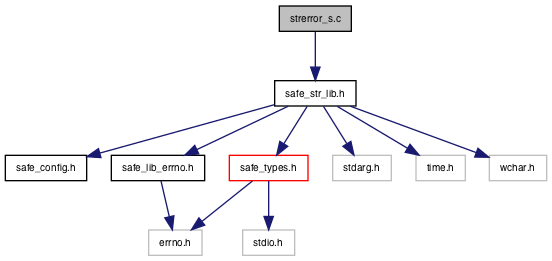#include "safe_str_lib.h" Include dependency graph for strerror_s.c:
Include dependency graph for strerror_s.c:Functions | |
| EXPORT errno_t | strerror_s (char *dest, rsize_t dmax, errno_t errnum) |
The strerror_s function returns a pointer to the textual description of the system error code errnum, identical to the description that would be printed by perror(). More... | |
| EXPORT size_t | strerrorlen_s (errno_t errnum) |
The strerrorlen_s function returns the untruncated length of the textual description of the system error code errnum, identical to the description that would be printed by perror(). More... | |
Function Documentation
◆ strerror_s()
| EXPORT errno_t strerror_s | ( | char * | dest, |
| rsize_t | dmax, | ||
| errno_t | errnum | ||
| ) |
The strerror_s function returns a pointer to the textual description of the system error code errnum, identical to the description that would be printed by perror().
In addition to strerror() it adds the size of the destination array in order to prevent buffer overflow, and it truncates overlong error messages with "...".
No more than bufsz-1 bytes are written, the buffer is always null-terminated. If the message had to be truncated to fit the buffer and bufsz is greater than 3, then only bufsz-4 bytes are written, and the characters "..." are appended before the null terminator. The behavior is undefined if writing to dest occurs past the end of the array, which can happen when the size of the buffer pointed to by dest is less than the number of characters in the error message which in turn is less than dmax.
- Remarks
- SPECIFIED IN
- C11 standard (ISO/IEC 9899:2011): K.3.7.4.2 The strerror_s function (p: 622) http://en.cppreference.com/w/c/byte/strerror
- ISO/IEC TR 24731, Programming languages, environments and system software interfaces, Extensions to the C Library, Part I: Bounds-checking interfaces
- Parameters
-
[out] dest pointer to a user-provided buffer. [in] dmax restricted maximum length of dest [in] errnum integer value referring to an error code
- Precondition
- dest shall not be a null pointer.
- dmax shall not be greater than RSIZE_MAX_STR.
- dmax shall not equal zero.
- Returns
- Zero if the entire message was successfully stored in dest, non-zero otherwise.
- Return values
-
EOK on success ESNULLP when dest is a NULL pointer ESZEROL when dmax = 0 ESLEMAX when dmax > RSIZE_MAX_STR ESLEMIN when the result would be longer than 4 and dmax < 4
- See also
- strerrorlen_s()
◆ strerrorlen_s()
| EXPORT size_t strerrorlen_s | ( | errno_t | errnum | ) |
The strerrorlen_s function returns the untruncated length of the textual description of the system error code errnum, identical to the description that would be printed by perror().
- Remarks
- SPECIFIED IN
- C11 standard (ISO/IEC 9899:2011): K.3.7.4.2 The strerrorlen_s function (p: 622) http://en.cppreference.com/w/c/byte/strerror
- ISO/IEC TR 24731, Programming languages, environments and system software interfaces, Extensions to the C Library, Part I: Bounds-checking interfaces
- Parameters
-
[in] errnum integer value referring to an error code
- Returns
- The length of the error message or 0
- See also
- strerror_s()
